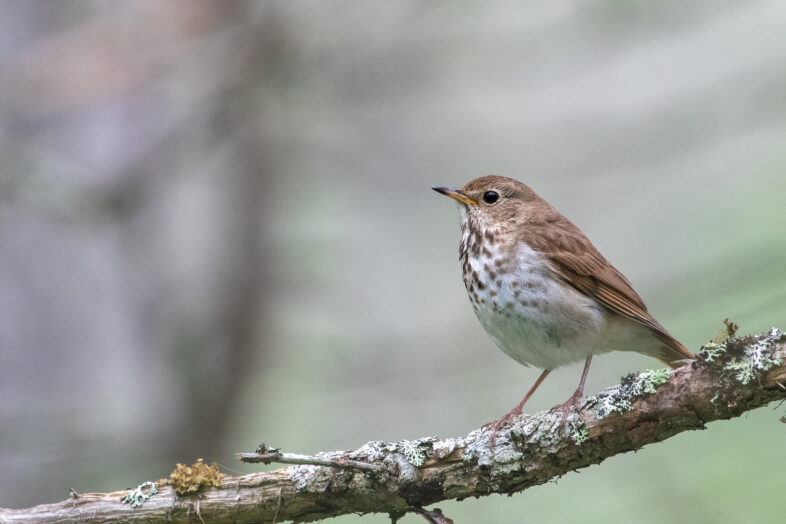
A Hermit Thrush gazes into the forest. © Richard Littauer licensed under CC-BY
With all the bad environmental news, feeling hopeful about biodiversity conservation can be difficult. However, people across the U.S. are still working hard to protect wildlife, especially birds. Here are a few positive, bird-related bills currently before Congress that reflect their can-do attitude and perseverance.
Local Communities & Bird Habitat Stewardship Act
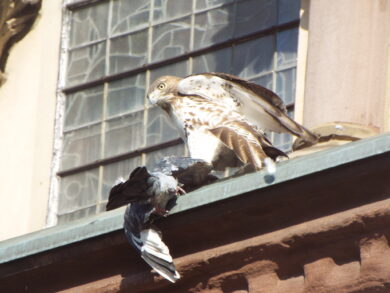
A Red-tailed Hawk pauses with its prey. © Jonathan Layman licensed under CC-BY
Since the turn of the century, the U.S. Fish & Wildlife Service (USFWS) has collaborated with city partners under the Urban Bird Treaty program to conserve birds, protect their habitats, and educate urban and suburban communities.
In addition to designating partner cities, the Urban Bird Treaty Program also offers a grant program administered by the National Fish & Wildlife Foundation and funded by several agencies and corporate partners. The program has funded Saltmarsh Sparrow monitoring, habitat management, and educational programs in Boston, MA; restoration of schoolyard habitats and urban green spaces in New Haven, CT; and training for high schoolers on how to plant native trees for bird habitat in Providence, RI. (You can check out all of their funded projects here.)
The Local Communities & Bird Habitat Stewardship Act of 2025, a bipartisan bill introduced as H.R. 3276 by Rep. Debbie Dingell (MI-6) back in May, would direct the Secretary of the Department of the Interior to formally establish the Urban Bird Treaty Program as its own, separate grant program. Under the bill, the program would receive $1 million in annual funding, authorized by Congress, from fiscal year 2026 to fiscal year 2031.
In a statement about the bill for American Bird Conservancy, Bryan Lenz, Glass Collisions Program and Bird City Network Director, said, “The Urban Bird Treaty Act reaffirms the value of the Urban Bird Treaty program, propelling it to have a greater impact in the future. This will help reduce threats to birds so that they can thrive in urban spaces.”
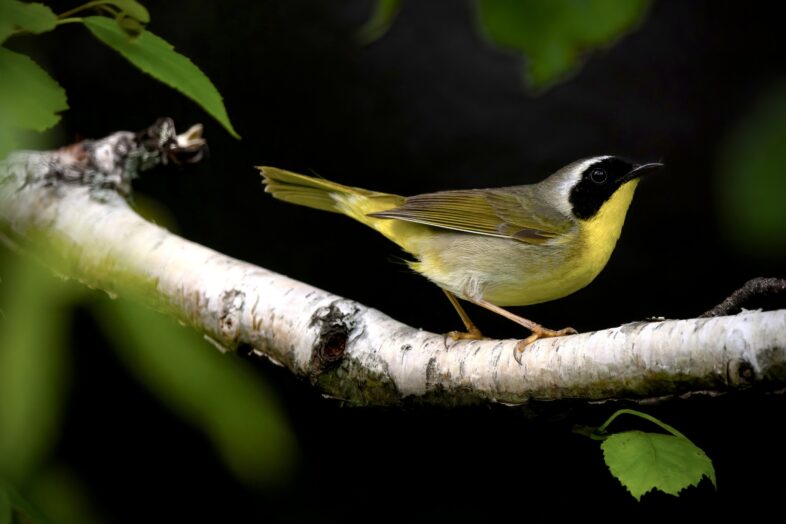
A Common Yellowthroat perches on a branch. © Matt Felperin
Migratory Bird Protection Act
For nearly all of its 100-plus-year existence, most federal administrations have interpreted the Migratory Bird Treaty Act to prohibit the killing of birds incidental to an otherwise legal activity. Thanks to the MBTA’s combination of fines and financial incentives, companies typically take precautionary measures to minimize harm to migratory birds, such as installing netting over oil pits and toxic wastewater.
In 2017, the Department of the Interior under President Trump adopted the first-ever rule exempting incidental takes from enforcement. The Biden Administration reversed this rule, but the second Trump Administration has since reversed it back. Ultimately, this flip-flopping creates costly uncertainty for companies trying to comply with the law.
H.R. 3188, the Migratory Bird Protection Act of 2025, was introduced by Representatives Jared Huffman (CA-2) and Brian Fitzpatrick (PA-1) with the aim of providing consistency going forward. If passed, the bill would provide the Department of the Interior with tools to address incidental takes and regulate industrial sources of bird mortality. The law specifically directs USFWS to develop a permit process authorizing incidental takes to minimize regulatory burdens and provide clarity for companies in complying with MBTA. It will also require regular reports to Congress on, among other things, the conservation status of migratory birds.
“Thanks to the leadership of Representative Huffman, the Migratory Bird Protection Act will implement a streamlined permitting approach that provides greater certainty for project stakeholders as well as long-term benefits for migratory bird species,” Ed Arnett, CEO of The Wildlife Society, stated in a press release.
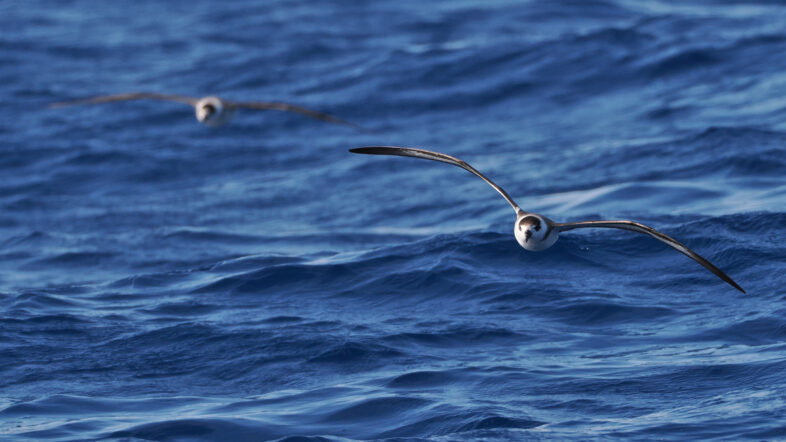
A pair of Black-capped Petrels cruises above the waves off the coast of North Carolina. By iNat user stevestevens licensed as public domain
Albatross and Petrel Conservation Act
The U.S. currently protects three albatross and petrel species that breed within its boundaries through the MBTA and the Endangered Species Act. However, these laws offer little protection to bird species once they fly beyond U.S. waters.
Albatrosses and petrels are some of the world’s most vulnerable seabirds. Of the 22 species of albatross recognized by the International Union for Conservation of Nature, 15 are threatened with extinction, and eight are either endangered or critically endangered. Likewise, more than half of all petrel species are threatened with extinction.
H.R. 3189, the Albatross and Petrel Conservation Act of 2025, would require the U.S. to implement the international Agreement on the Conservation of Albatrosses and Petrels (ACAP). Currently, 13 countries have signed on to this binding agreement, which promotes the conservation of 31 species of migratory seabirds. Although the U.S. has contributed to and occasionally attended ACAP meetings since 2001, the country has yet to sign on.
The bill’s sponsors note that by implementing ACAP, the U.S. can increase the Agreement’s international influence and resources, improve its ability to conserve seabirds, and promote more stringent international fishing regulations. They specify that domestic fisheries will not be subject to additional restrictions on their activities under the proposed legislation—instead, they expect the law to make U.S. fisheries more competitive.
“By codifying the ACAP agreement, the United States can guarantee its leadership position for conservation and urge other nations to adopt strong standards to ensure international protections for endangered seabirds,” Rep. Huffman said in a press release. “Combined with legislation that helps formalize and provide certainty for commercial and business interests to comply with the MBTA, my bills provide the opportunity for the United States to improve wildlife conservation both at home and around the world.”
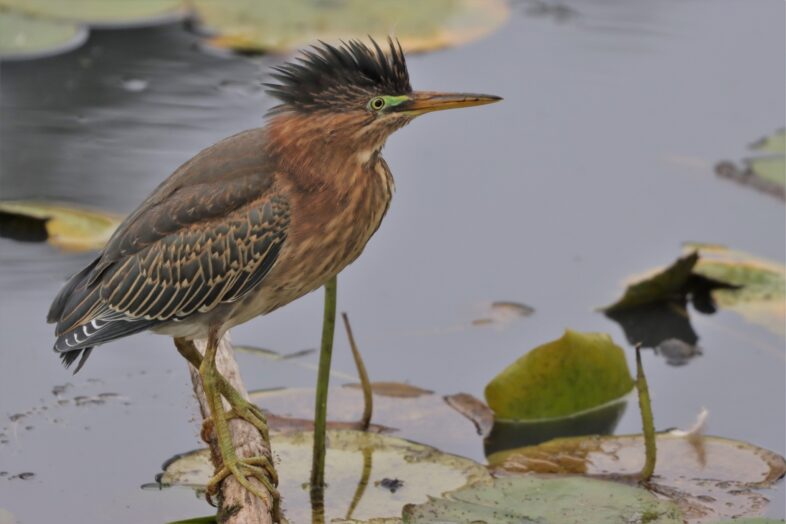
A Green Heron scans the water for signs of prey. © Kristin M. Tolle licensed under CC-BY
Northwest Wetlands Voluntary Incentives Program Act
A 2024 report from the USFWS shows that the lower 48 states have lost 50% of their wetlands since the 1780s, with the rate of loss accelerating over the past two decades. S. 1615, the Northwest Wetlands Voluntary Incentives Program Act, would establish a federal grant and assistance program, empowering government, tribal, nonprofit, and private entities to collaborate in restoring and enhancing habitats for wetland-dependent bird species living in the Colorado River Basin and along the Oregon-Washington coast.
In a press release from Senator Mike Crapo (R-Idaho)—one of the two legislators sponsoring the bill—numerous Pacific Northwest organizations note the value of this bill for wildlife and people.
“The bill supports wetlands conservation on the coast of Oregon and Washington and within the Columbia River Basin; areas that are vital for millions of waterbirds and wetland-dependent species…” said Glenn Lamb, Vice Chair of the Pacific Birds Habitat Joint Venture Board of Directors in the press release. “This bill will provide resources for the installation, maintenance, and replacement of critical infrastructure, which aligns with Pacific Birds’ goal to support long-term habitat management while emphasizing multi-species benefits and multi-benefit projects, and empowering collaborative on-the-ground action.”
These bills show that, despite the alarming headlines, there are still individuals committed to developing targeted conservation policies. If you would like to learn more about each of these bills, visit Audubon or American Bird Conservancy for more information.
